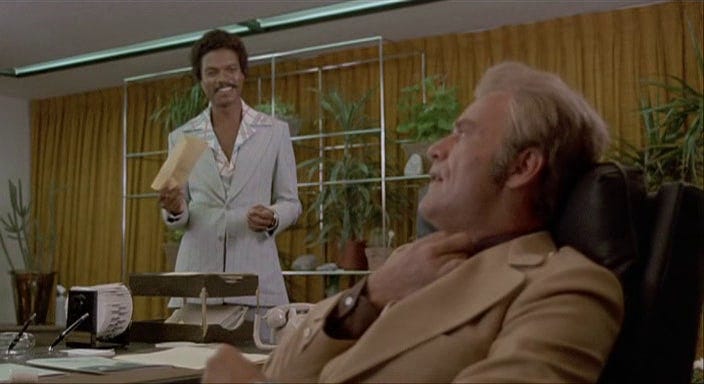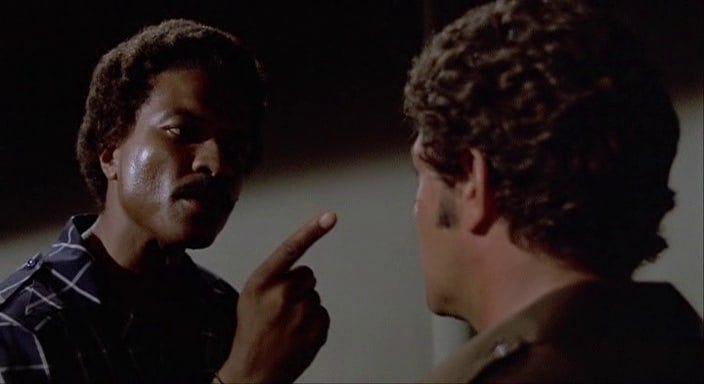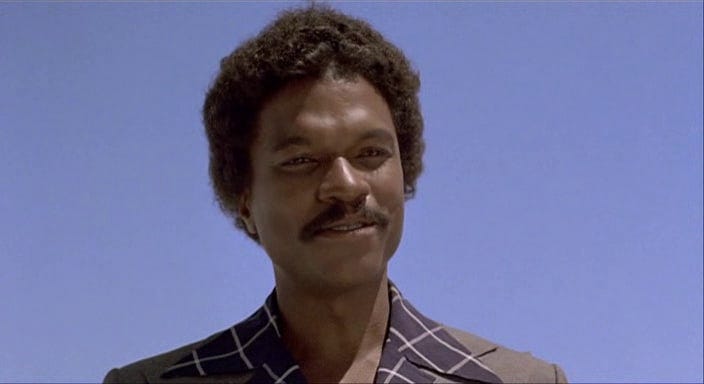Blaxploitation Education: The Take
Billy Dee Williams is a corrupt cop in a movie that's kind of a snoozer.
The Take
Written by Franklin Coen and Del Reisman
Directed by Robert Hartford-Davis
1974
It seems like Billy Dee Williams should have been a bigger Blaxploitation star than he was. He had everything he needed for success in that field, with his handsome looks, smooth voice, and charismatic swagger. He could play characters that were suave and confident, with just enough of an edge to make you believe that he was ready to throw down when necessary. Given the right role in the right movie, he could have stood alongside the greats of the genre.
Unfortunately, it seems that he never really managed to get that role. Maybe he was too mainstream and wasn’t really involved in the quick, cheap “B” movies where the genre really flourished, or maybe he just didn’t get the opportunity to star in a Blaxploitation film with a good director and solid script. Whatever the reason, it’s disappointing to see the potential for greatness go unrealized.
The Take is a case in point, being a crime movie that gave Williams the opportunity to play a man of questionable morals who manages to outsmart everyone around him. Unfortunately, he seems less like a guy who stays a step ahead of the people who are trying to use him or take him down and more like someone who wanders through the story reacting to what happens around him and managing to come out on top because that’s what’s supposed to happen. It’s just a series of events that don’t always make much sense, and while Williams does seem smart and capable, he doesn’t have much of a master plan, and he prevails in the end through only the most basic amount of preparation.
The film is based on a novel with the excellent title of Sir, You Bastard, by G.F. Newman. That was the first in a series of books about a corrupt Scotland Yard inspector, but the movie adaptation shifted the action to the American Southwest. This may be the reason that while the main character is Black, there is exactly zero attention paid to his race during the movie. It certainly seems like there could be a racial element to a story about a corrupt cop who doesn’t trust the system to serve his best interests but also wants to avoid being a pawn of powerful criminal organizations. But no, it’s another one of those stories where an actor of any race could have been plugged in to the movie without the need to make any adjustments to the script whatsoever.
The movie does get off to a promising start, with Williams’ character, who is only referred to as Sneed (a name that fits a British character much better than a Black American one), flying from San Francisco to Paloma, New Mexico in order to make a career move where he’ll be working with the local police department to combat organized crime. Scenes of his flight and arrival are cross-cut with scenes in which some criminals involved in the local mob are being tried at a New Mexico courthouse while some shady types are gathering in the courtroom and around the building. This turns out to be an escape attempt, with the bad guys sneaking in some weapons, shooting several guards, and trying to get away in a laundry van. But they’re foiled when Sneed and his new partner show up at the courthouse. He jumps into action, blocking the van from getting away, shooting a few of the criminals, and managing to recapture the guys who were trying to escape. Exciting stuff!
Unfortunately, the rest of the movie doesn’t really live up to the expectations set by the opening. While Sneed is lauded as a hero who will help the police in their fight against crime, one of the first things he does is visit a local paper company and meet with the head of “the syndicate,” Manso (Vic Morrow), who offers him a bribe. While one might expect the hero of the movie to reject this offer, Sneed accepts, grinning the whole time as if he’s surprised by Manso’s audacity but also recognizes that the guy has his number. It seems that Sneed started his career in New Mexico before moving to San Francisco, and after being unfairly blamed for a partner’s corruption, he had some distrust in the system, and he had gained a reputation as someone who could be bought. With an understanding of these expectations, Sneed seems to be happy to take whatever money he is offered.
However, he seems less willing to just follow Manso’s orders, and he’s still going to try to work with the police to fight organized crime. In fact, he mostly comes off as a hardass cop who is willing to intimidate and brutalize criminals if that’s what’s necessary. He drags in some random suspect and gets the guy to give him some information by threatening to make his life a living hell by repeatedly arresting and beating him, and he uses that information to track down some drug dealers. This leads to a pretty harrowing scene of police misconduct in which he questions an overweight man in the middle of the police station, forcing him to strip naked and do jumping jacks until the drugs he had hidden somewhere on his person fall out. This, more than the bribery and corruption, is what really makes him come off as a guy who is on the wrong side of the law.
While Manso tries to get Sneed to let the drug dealer go, he refuses, saying that it’s too late to do so, since the guy has already been booked, processed, and charged. This leads to some retribution, with Manso having his thugs beat Sneed up as a lesson. However, despite the problems that Sneed has caused him, Manso still gives him another bribe. This is the odd pattern we see in the movie: Sneed keeps working with the police to stop Manso’s operations, and Manso keeps giving him more money for some reason, rather than, you know, deciding that it would be better to just get rid of the thorn in his side.
As the plot proceeds, there are some occasional attempts at excitement, including a scene where the police are trying to find drugs or some other unknown contraband that is being smuggled from the paper company, and Manso keeps sending out decoy delivery vans before Sneed finally manages to track down the right one. You would think that finding illegal materials would provide them with a reason to raid the syndicate’s headquarters and arrest Manso, but no, Sneed and the police just keep investigating, and Sneed keeps accepting bribes. The details of this criminal operation are pretty fuzzy, and the methods of investigating and prosecuting crimes used by the police also seem to bear little resemblance to anything approaching reality.
There’s a whole subplot about Sneed bringing in a guy who works as his accountant or lawyer or something. This guy is supposed to launder his bribes and invest them in legitimate businesses, but I’m uncertain what purpose he serves in the plot. It seems like he’s mostly there for Sneed to have someone who is fully on his side rather than being part of either the cops or the syndicate. Eventually, the two of them come up with a scheme to save Sneed from being charged with corruption, and it’s just about the most simplistic version of subterfuge possible; they swap the envelope of cash he receives for another one, and then when the police catch him with bribe money and try to compare it with the serial numbers that Manso had fed them, there are no matches. Since they can’t prove that the cash he was carrying was a bribe, he gets off scot free. I don’t think that’s the way these types of investigations work, but as mentioned, there’s little in this movie that resembles reality.
In the end, this movie ended up being kind of boring, despite occasional bits of action that kept my attention from completely wandering away. There’s a sort of an attempt to create a love interest with an old girlfriend of Sneed’s (Tracey Reed, who was in Trouble Man) but she doesn’t seem to want to have much to do with him, and aside from a bit where she nurses him back to health after he’s beaten up, she mostly disappears from the movie.
It seems like this story could have worked if more time had been spent to create a script that explained the various plot machinations in a way that made more sense or made it seem like Sneed had some sort of plan to play the cops and the criminals against each other. Instead, I was left wondering why I should have cared about anything that happened, and I felt like I knew nothing about who Sneed was as a character or whether there was any point to anything he had done. It’s a shame to say that about a character played by someone as charismatic as Billy Dee Williams. It’s too bad that he didn’t get a real chance to shine until he showed up in a galaxy far, far away; he could have been the next sex machine that all the chicks of the 1970s were waiting for.
Blaxploitation Education index:
UpTight
Cotton Comes to Harlem
Watermelon Man
The Big Doll House
Shaft
Sweet Sweetback’s Baadasssss Song
Super Fly
Buck and the Preacher
Blacula
Cool Breeze
Melinda
Slaughter
Hammer
Trouble Man
Hit Man
Black Gunn
Bone
Top of the Heap
Across 110th Street
The Legend of N***** Charley
Don’t Play Us Cheap
Shaft’s Big Score!
Non-Blaxploitation: Sounder and Lady Sings the Blues
Trick Baby
The Harder They Come
Black Mama, White Mama
Black Caesar
The Mack
Book of Numbers
Charley One-Eye
Ganja & Hess
Savage!
Coffy
Shaft in Africa
Super Fly T.N.T.
Scream Blacula Scream
Cleopatra Jones
Terminal Island
Gordon’s War
Slaughter’s Big Rip-Off!
Detroit 9000
Hit!
The Spook Who Sat by the Door
The Slams
Five on the Black Hand Side
The Black 6
Hell Up in Harlem
I Escaped From Devil’s Island
Blackenstein
The Bad Bunch
That Man Bolt
Willie Dynamite
The Arena
Black Belt Jones
Sugar Hill
Tough Guys
Foxy Brown
Thomasine & Bushrod
Black Eye









Billy Dee got dealt a bad hand by Hollywood. He was clearly capable of being more than just Lando Calrissian (whom Sneed oddly resembles in terms of personality...).